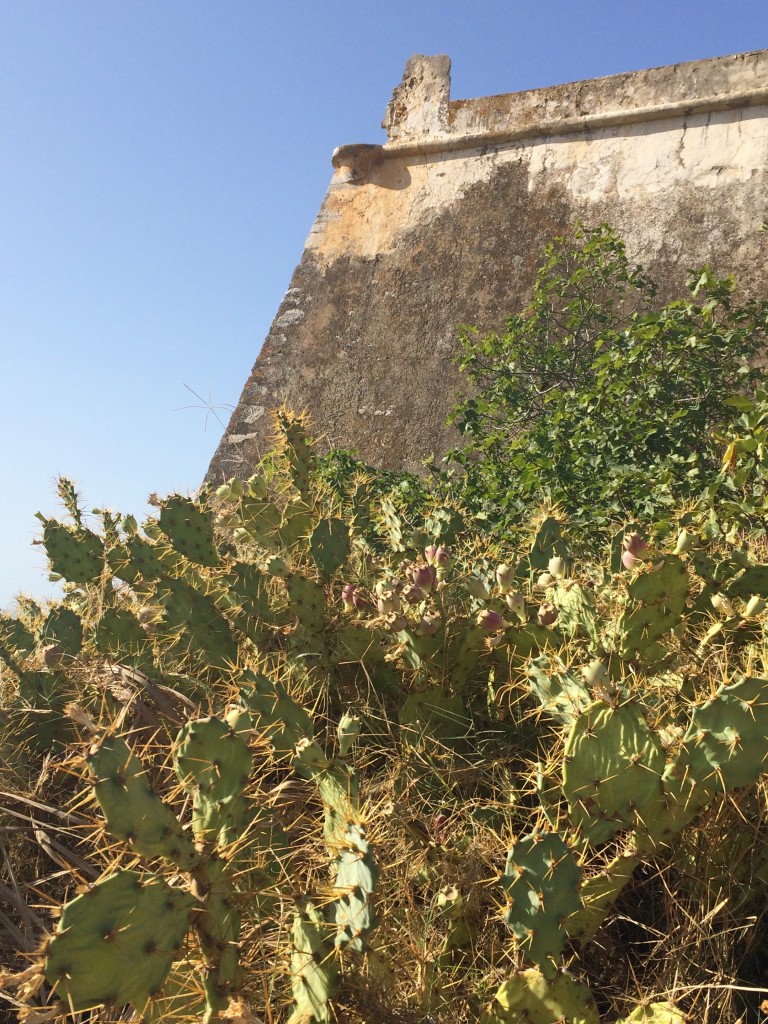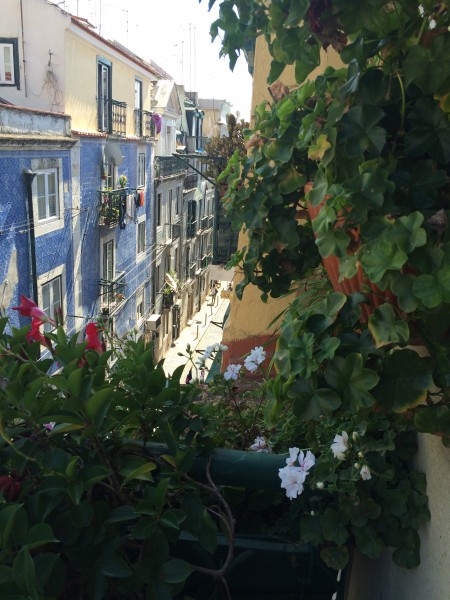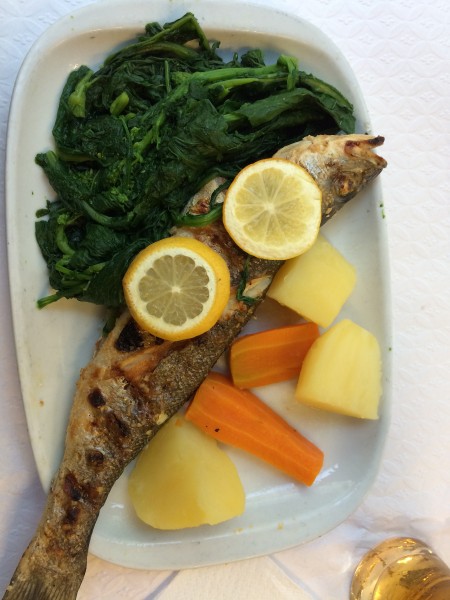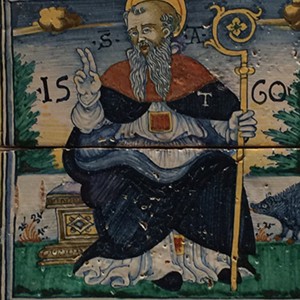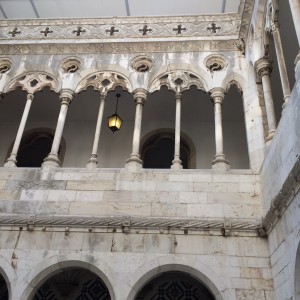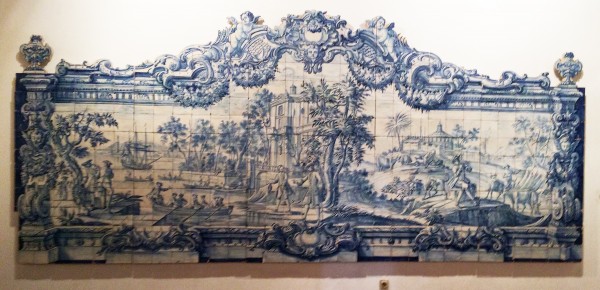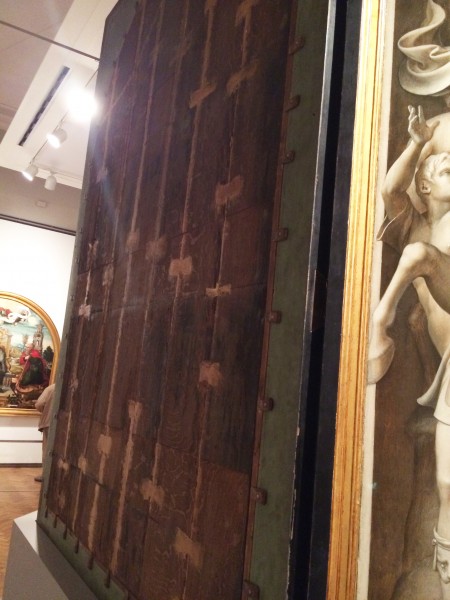Time out of time– discovering Lisbon
The thing I remember about leaving the Algarve is the morning light striking the car hard and bright as I drove along a ridge line. It was a secondary road that roughly paralleled the autoroute. In my mind I was trying to make peace with leaving. It had been an intoxicating mix of coastal light, stone and sand, cactus and pine. Cultures crossing in pretty old villages. The occasional palm tree or Moorish ruin. Desert stars. It was bright blue and dusky beige, warm and relaxed. Along the drive there were a couple of fine old hill towns, scattered villas, hovels, and a gas station or two. I recall a vast ranch, nothing growing there but cattle, that went on for miles and miles. Lots of space empty of humanity. I crossed a river on a long and dramatic bridge and I was in Lisbon.
My apartment was on a narrow street in the Barrio Alto, at the highest point, looking down one of the perpendicular streets that rose up the hill for blocks to the front door. I chose the apartment because the landlord was a plant lover and his terrace was smothered in flowers and vines, and because I could perch there, above the neighborhood and see my way down to the street or up to the sky.
On the cab ride, the driver acted as tour guide. “This is the principle road. There is the river. This is the university. The bullfights take place here. This is your neighborhood.” Among the most surprising bits of information was the news that Lisbon is small. I chalked that comment up to the attitude of a city dweller, but once I found myself walking the city I discovered how right he was. The driver pointed out a street-long once-a-month antiques market on the boulevard below my neighborhood and as soon as I got my suitcase upstairs I set off to find it. It was an easy 10 minutes, all downhill.
I poked through all the offerings. I guess I wanted something so essentially Portuguese that it would bring back the day and place for me always. A kind of gypsy dealer with a mixed bag of trash and treasure had a 19th century carved wood and gessoed Christ figure. There was no cross, only the figure with his attenuated arm loose beside him. His fingers and toes were gone. But he bore the spiritual energy of his maker. He was both icon and art. So in my best bartering French I offered the dealer less, and he reluctantly took my offer, congratulating me on my good fortune and the fine price. I could not imagine a more intimate reminder of the many churches I’d stood in, listening for echoes, than this Cristo.
In the city there was no wildlife and I couldn’t see the stars for the streetlights, but the sunlight glanced off the river and illuminated every surface with liquid reflections blocks and blocks deep. Built on seven hills, Lisbon has a little funicular that climbs one of them. It’s a tourist filled ride… we were like the fabled Portuguese sardines packed into old-school trolleys or the hill-climber. You could spot a native because any young Portugese person– anyone— even someone with a prime seat on a sight-seeing vehicle, would immediately surrender it to anyone who was older. And the Portugese elders took the seats with little more than a nod— with a sense that it was as it should be. Non-natives (like me) would try to decline but the young Portuguese could not allow themselves to accept a no.
My landlord left me with a big bowl of fresh fruit, a bottle of port and a box of fresh pastries. And there were directions to all the best places to eat. I chose one he promised was very Portuguese and very inexpensive. I walked in, a bit overwhelmed by the number of people seated family style at long tables. The last seat at the counter was vacant, closest to the grill master, so I took it. Lucky choice. He put on quite a show, like any fine-tuned short order cook who works a grill all day every day. The grill, in the front window of the restaurant, burned wood and on it he had all the restaurant’s offerings: pork liver, mackeral, sardines, rabbit, sea trout, sausages, steak, chickens, chickens, chickens speared on skewers that looked like swords. He dressed them all first with sea salt. Every few minutes he would pull off another chicken and cut it to pieces with what looked like super sharp garden shears.
I flashed back to my childhood when my parents would take us to a tiny dive where we sat on a stool at a bar across from an open hickory fire and watched our barbecue being cooked, then watched it being chopped and dressed. This guy even had on the same kind of hat. Only the Portuguese chef would, every few chickens, draw himself a draft of Portuguese beer, take a quick swig and toss the rest into the trash can.
The meal was exquisite. So good I came back again. My favorite meal there was grilled sea bass served with a wedge of lemon, potatoes and carrots and some potent green vegetable that looked like spinach gone to seed. The gentle vegetable broth, the smoke of the fish and the lemon made a lovely combination. Once home I opened the bottle of port and watched the city below the apartment come to nightlife.
Lisbon was an elaborate, ornate display case for Portuguese history and tastes. Every day I chose a museum, or nearby village, palace or monastary to visit, and with each one my perceptions of the culture deepened.
One of my primary reasons for visiting Portugal was to look at the tiles, the murals (azulejos) that appear in all kinds of places. The Museu Azulejos was one of Lisbon’s most remarkable gems. I was stunned by the beauty of the monastery where it’s housed, and again by the collection of old pictorial tiles. What’s interesting to me is the fragmentation of a scene into pieces. The impact is not so much from skillful painting— the painting is generally naive. . It’s more a matter of the fragmentation, the repetition of marks, the complex patterning,the bright colors and hard glossiness. Many of them are blue on white. My theory is the gloss and the blue are unconscious references to the sea which, in Portugal, is never far away.
In response to Portugal’s Inquisition, the state disbanded all religious orders in 1834 and took possession of all the real estate and art treasures that had formerly belonged to the church. A visit to the Nacional Museu de Arte Antiga was fascinating– especially to track the provenance of the works. The museum was filled with masterpieces and minor masterpieces that had begun their lives as sacred objects in monasteries and convents throughout the country. There were, thus, many large three part altarpieces. Interestingly, they were displayed away from the wall, so a viewer could walk around and see the construction from the back. It was the first time I had a visual of what it means for a very old painting to be rendered on wood. These massive paintings were made of many oak boards put edge to edge together. Sometimes the seam would fall in the middle of the Virgin Mary’s face or some other crucial place. Knowing the huge movement of wood as seasons and humidity changes it’s remarkable that these paintings are in such excellent condition, especially since they started their lives in unheated stone buildings.
Sometimes I got off public transit in an unknown neighborhood and allowed myself to get lost. I found an interesting hardware store one day that way. Portuguese hardware stores are great repositories of tools for applying grout, laying tile, removing tile, applying stucco and chipping away at stucco. I found a paint roller that was rubber and had a funny raised pattern on it. I bought it to use in the studio to make marks.
Another of my delights was choosing things from Portugese menus that had no translation– trying dishes that were a mystery. I can now attest to the deliciousness of grilled maigre, a kind of Portugese swordfish, and cuttlefish salad, a variant, I would say, from looking at the photo on Google, of octopus. I will confess to not being able to muster the courage to eat eels in southwest France ( but only to you) however, once safely in Portugal I was fearless. What is there to fear in a country where all the bread was baked this morning and all the fish were swimming in the ocean yesterday? It was fun to step into a pastry shop and point, not knowing if a pastry was sweet or savory, or to choose a cheese I’d never heard of. This led, of course, to hits and misses, but by far there were more hits than misses. And each time I took a chance I felt like one of the great explorers, as if I’d discovered something remarkable for the very first time.


